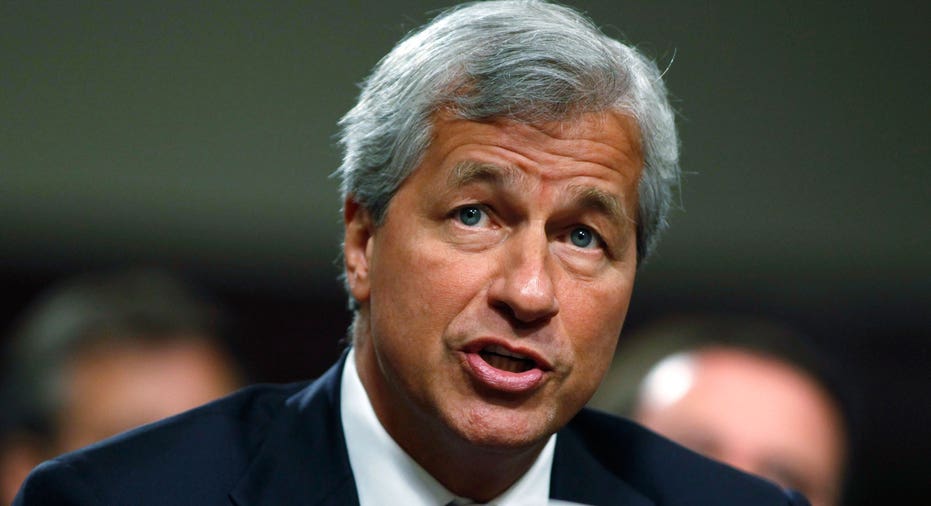Oil: An Economic Catalyst or Doomsday Indicator? J.P. Morgan CEO Dimon Gives His Forecast

Lower energy prices have led to higher corporate bankruptcy rates, which are currently on pace for a 23 percent year over year increase through 2015. Additionally, corporate credit spreads have widened considerably.
For many years, economic watchers have called lower oil prices a major boon to any economy. The theory makes sense; if you save money at the gas pump, you're likely to spend it on other stuff and boost the economy. And since consumer spending represents two thirds of economic growth, you would expect a drop to be good news.
But over the past year, oil prices have plummeted by more than 50 percent, sending gasoline below $2.00 in some regions of the country. Yet global financial markets keep selling off on economic growth worries and consumer spending is not all that, at all. The problem is there are knock on effects to the sharp selloff in oil.
First, the energy boom over the last five years has been a great jobs creator and a boost for capital markets and business. Big banks like J.P. Morgan (NYSE:JPM) and others enjoyed robust lending to shale companies which were capitalizing on sky high oil. Now that a sharp reversal is underway, everyone is taking a hit. The question now is - will low oil prices really help consumers who will spend the savings or is cheap oil an indicator that things are bad - China and the emerging markets are buying less, supply is too high and there is simply too much oil in the market.
As a result banks are left holding the bag for those loans. I asked J.P. Morgan CEO Jamie Dimon to weigh in on the oil dilemma and with his earnings out this Thursday he clued us in on the potential impact oil may have on results.
Still, he remains confident that lower oil prices will benefit the U.S. consumer, citing exclusive data from the JPMorgan Chase Institute which shows that consumers are more comfortable spending the savings and at some point, the economy will reflect it. Even in the face of rising healthcare costs.
The good news is these lean times have helped consumers shape up. The savings rate has risen to 5.6 percent. So people are poised to spend money as soon as they feel better. The question is when will that be? Dimon shares his thoughts in this excerpt from our conversation.
BARTIROMO: What's the impact of the drop in oil that we've seen? How confident are you that the major banks, J.P. Morgan included, have their energy exposure in check?
DIMON: There's an industry where, obviously prices have changed. Remember, commodity prices change like this all the time, and all different commodities, so you should somewhat be prepared for it. And, obviously, debtor countries will be hurt. We'll be fine. We're going to lose some more money on it. I want to be FD [full disclosure] compliant here, we told the world that if oil goes to $30 dollars and stays there for 18 months it would cause us to increase reserves by something like $500 million dollars. Which is fine, we're still going to help these companies get through it, our clients. It's important that we're there in good times and bad. You can't be a bank, and the second something goes wrong you go running. There is a beneficiary of lower oil prices, right? it's bad for Brazil, it's good for India. It causes different flows in the countries around the world, but it's good for consumers, and businesses. So, all those who consume energy are paying lower prices. We have the J.P. Morgan Chase Institute which uses real data that consumers are spending 80 percent of the gas decrease. And they're spending it in T&E, maybe bigger SUV's and houses. It's a benefit a little bit as opposed to being, badly hurt. It's good for the American consumer. Gas is at $2 dollars, and if you adjust for inflation it's kind of the same price is was at 1960.
BARTIROMO: So, you see the data of what everybody's spending their money and you say that they're saving money at the gas pump and going out to hotels and entertainment.
DIMON: And, that's true across the country, by all income levels, about 80 percent, I think, is the number that we think they're spending.
BARTIROMO: And you think credit quality, is OK right now?
DIMON: Well, that's the other thing, this -- the average consumer has another $700, $800 dollars in their pocket every year, that's good for consumer credit too.



















